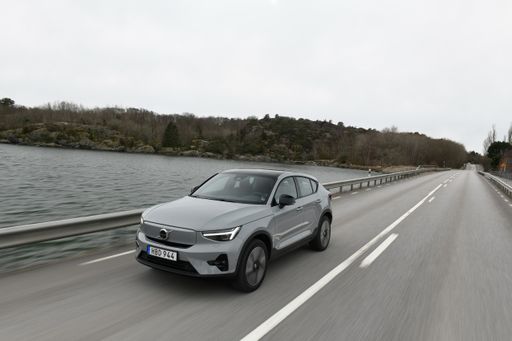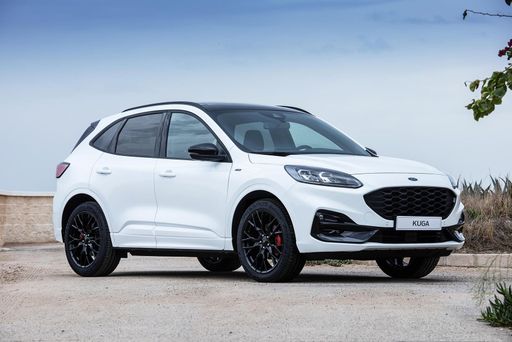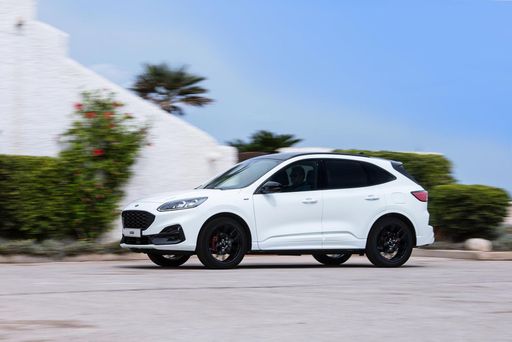Ford Kuga vs Volvo EC40 - Differences and prices compared
Compare performance (243 HP vs 442 HP), boot space and price (34200 £ vs 46600 £ ) at a glance. Find out which car is the better choice for you – Ford Kuga or Volvo EC40?
Costs and Efficiency:
Price and efficiency are key factors when choosing a car – and this is often where the real differences emerge.
Ford Kuga has a noticeable advantage in terms of price – it starts at 34200 £ , while the Volvo EC40 costs 46600 £ . That’s a price difference of around 12378 £.
As for electric range, the Volvo EC40 performs clearly better – achieving up to 584 km, about 516 km more than the Ford Kuga.
Engine and Performance:
Under the bonnet, it becomes clear which model is tuned for sportiness and which one takes the lead when you hit the accelerator.
When it comes to engine power, the Volvo EC40 has a decisively edge – offering 442 HP compared to 243 HP. That’s roughly 199 HP more horsepower.
In acceleration from 0 to 100 km/h, the Volvo EC40 is decisively quicker – completing the sprint in 4.60 s, while the Ford Kuga takes 7.30 s. That’s about 2.70 s faster.
In terms of top speed, the Ford Kuga performs hardly perceptible better – reaching 200 km/h, while the Volvo EC40 tops out at 180 km/h. The difference is around 20 km/h.
There’s also a difference in torque: Volvo EC40 pulls significantly stronger with 670 Nm compared to 240 Nm. That’s about 430 Nm difference.
Space and Everyday Use:
Beyond pure performance, interior space and usability matter most in daily life. This is where you see which car is more practical and versatile.
Both vehicles offer seating for 5 people.
In curb weight, Ford Kuga is evident lighter – 1526 kg compared to 2065 kg. The difference is around 539 kg.
In terms of boot space, the Ford Kuga offers minimal more room – 412 L compared to 404 L. That’s a difference of about 8 L.
In maximum load capacity, the Ford Kuga performs clearly perceptible better – up to 1534 L, which is about 338 L more than the Volvo EC40.
When it comes to payload, Ford Kuga evident takes the win – 550 kg compared to 435 kg. That’s a difference of about 115 kg.
Who wins the race in the data check?
The Volvo EC40 holds a decisive overall lead in the objective data comparison.
This result only shows which model scores more points on paper – not which of the two cars feels right for you.
Costs and Consumption
View detailed analysis
Engine and Performance
View detailed analysis
Dimensions and Body
View detailed analysis

Volvo EC40
Ford Kuga
The Kuga is Ford’s adaptable family SUV that blends usable space with a surprisingly lively driving character, making daily commutes and weekend escapes equally enjoyable. With smart interior packaging, an easy-to-use infotainment setup and composed road manners, it’s a sensible choice for buyers who want a bit of fun without the fuss.
details


Volvo EC40
The Volvo EC40 feels like a polished slice of Scandinavian calm on wheels, blending minimalist design with a cocoon-like interior that makes everyday driving surprisingly serene. It’s an electric compact that puts safety and comfort front and center, while still injecting enough personality and tech-savvy charm to keep city buyers smiling.
details
Costs and Consumption |
|
|---|---|
|
Price
34200 - 46300 £
|
Price
46600 - 59000 £
|
|
Consumption L/100km
2.8 - 6.8 L
|
Consumption L/100km
-
|
|
Consumption kWh/100km
-
|
Consumption kWh/100km
16.2 - 17.3 kWh
|
|
Electric Range
68 km
|
Electric Range
488 - 584 km
|
|
Battery Capacity
1.1 - 14.4 kWh
|
Battery Capacity
67 - 79 kWh
|
|
co2
55 - 154 g/km
|
co2
0 g/km
|
|
Fuel tank capacity
42 - 54 L
|
Fuel tank capacity
-
|
Dimensions and Body |
|
|---|---|
|
Body Type
SUV
|
Body Type
SUV
|
|
Seats
5
|
Seats
5
|
|
Doors
5
|
Doors
5
|
|
Curb weight
1526 - 1859 kg
|
Curb weight
2065 - 2185 kg
|
|
Trunk capacity
412 L
|
Trunk capacity
404 L
|
|
Length
4604 - 4645 mm
|
Length
4440 mm
|
|
Width
1882 mm
|
Width
1873 mm
|
|
Height
1673 - 1681 mm
|
Height
1591 mm
|
|
Max trunk capacity
1534 L
|
Max trunk capacity
1196 L
|
|
Payload
541 - 550 kg
|
Payload
395 - 435 kg
|
Engine and Performance |
|
|---|---|
|
Engine Type
Petrol, Full Hybrid, Plugin Hybrid
|
Engine Type
Electric
|
|
Transmission
Manuel, Automatic
|
Transmission
Automatic
|
|
Transmission Detail
Manual Gearbox, CVT, Automatic Gearbox
|
Transmission Detail
Reduction Gearbox
|
|
Drive Type
Front-Wheel Drive, All-Wheel Drive
|
Drive Type
Rear-Wheel Drive, All-Wheel Drive
|
|
Power HP
150 - 243 HP
|
Power HP
238 - 442 HP
|
|
Acceleration 0-100km/h
7.3 - 9.9 s
|
Acceleration 0-100km/h
4.6 - 7.3 s
|
|
Max Speed
195 - 200 km/h
|
Max Speed
180 km/h
|
|
Torque
240 Nm
|
Torque
420 - 670 Nm
|
|
Number of Cylinders
3 - 4
|
Number of Cylinders
-
|
|
Power kW
111 - 178 kW
|
Power kW
175 - 325 kW
|
|
Engine capacity
1496 - 2488 cm3
|
Engine capacity
-
|
General |
|
|---|---|
|
Model Year
2025
|
Model Year
2024
|
|
CO2 Efficiency Class
E, D, B
|
CO2 Efficiency Class
A
|
|
Brand
Ford
|
Brand
Volvo
|
What drivetrain options does the Ford Kuga have?
The Ford Kuga is available as Front-Wheel Drive or All-Wheel Drive.




